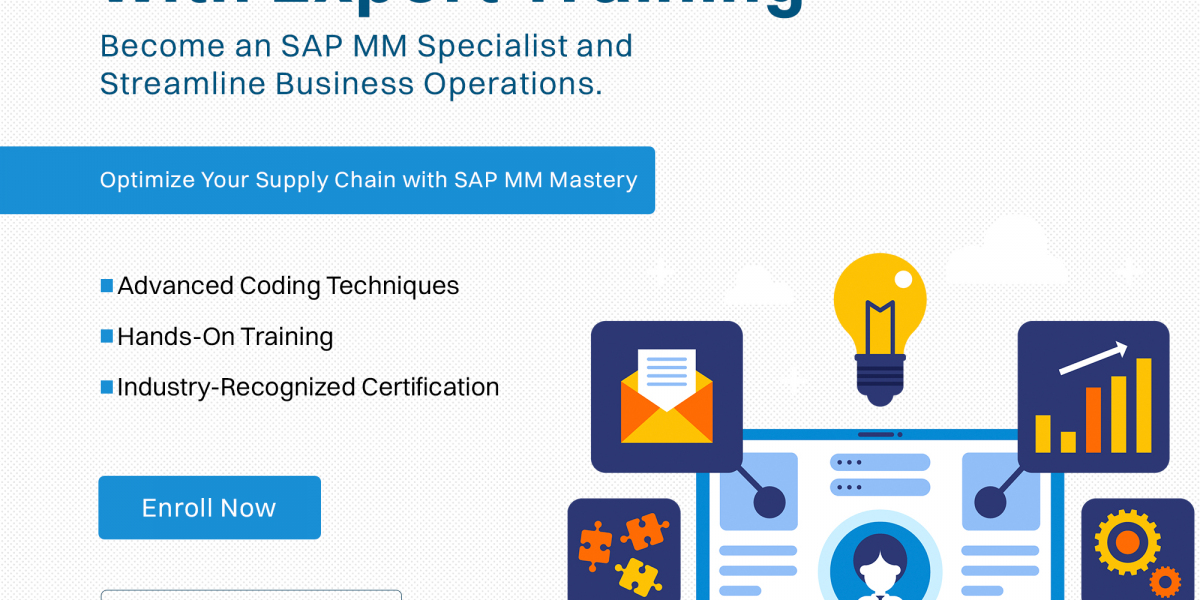In the competitive landscape of supply chain management, mastering material management processes is essential for any organization striving for operational excellence. The SAP MM (Materials Management) module is a critical component of SAP's ERP (Enterprise Resource Planning) suite, providing comprehensive solutions for managing procurement, inventory, and vendor relationships effectively. Understanding the SAP MM course syllabus is pivotal for professionals aiming to harness the power of this module and elevate their careers.
This blog will delve into the essential components of the SAP MM course syllabus, the relevance of each topic to real-world applications, and how completing the course can position professionals for success in various industries.
The Significance of SAP MM in Supply Chain Management
SAP MM plays a vital role in optimizing material flows and procurement processes. With global supply chains becoming increasingly complex, businesses must implement efficient strategies to manage their material needs. The SAP MM course syllabus serves as a roadmap for professionals looking to enhance their skills in this area.
The course begins with an introduction to the SAP ERP environment, explaining how the MM module integrates with other critical SAP components, such as SAP FICO (Financial Accounting) and SAP SD (Sales and Distribution). Understanding this integration is crucial, as it lays the foundation for mastering more advanced topics later in the course. This foundational knowledge helps learners appreciate how material management influences other areas of business operations, such as finance, sales, and logistics.
Key Topics Covered in the SAP MM Course Syllabus
- Procurement Process Management
The course provides a thorough understanding of the procurement process, which is at the heart of SAP MM. Learners explore how to create purchase requisitions, manage purchase orders, and establish contracts with suppliers. Practical exercises allow participants to engage with the procurement cycle, emphasizing the importance of accuracy and timeliness in purchasing activities.
By mastering procurement process management, professionals can contribute significantly to their organizations’ cost-saving initiatives and operational efficiencies. They learn how to negotiate with suppliers, evaluate vendor performance, and manage supplier relationships, which are all critical skills in today’s fast-paced business environment.
- Inventory Management
Effective inventory management is paramount for ensuring that businesses maintain optimal stock levels while minimizing excess inventory costs. The SAP MM course syllabus covers various inventory management topics, including stock tracking, inventory valuation, and physical inventory processes.
Participants learn how to utilize SAP MM tools to manage stock movements accurately, ensuring that inventory records reflect actual stock levels. This knowledge helps organizations avoid stockouts and overstock situations, thereby enhancing customer satisfaction and reducing carrying costs. Additionally, students gain insight into the impact of inventory management on overall supply chain efficiency.
- Master Data Management
A significant part of the SAP MM course syllabus is dedicated to master data management. This includes creating and maintaining essential data for materials and vendors. Understanding the importance of high-quality master data is crucial, as inaccuracies can lead to operational inefficiencies and financial discrepancies.
Learners explore the types of master data within SAP MM, such as material master records, vendor master records, and purchasing info records. They are trained to ensure data integrity, which is vital for generating accurate reports and making informed business decisions.
- Configuration and Customization
One of the most valuable aspects of the SAP MM course is the focus on system configuration and customization. Professionals learn how to tailor the SAP MM module to meet the specific needs of their organizations. This includes configuring purchasing workflows, customizing inventory management processes, and setting up valuation and account determination settings.
Understanding how to configure the system empowers professionals to optimize material management processes effectively. They learn to identify areas for improvement and implement changes that align with their organization’s strategic goals.
Advanced Topics and Special Functions
As participants progress through the course, they encounter advanced topics that expand their expertise in SAP MM. These topics include:
- Special Procurement Processes: The course syllabus includes in-depth training on special procurement processes such as consignment, subcontracting, and third-party procurement. Professionals learn how to manage these processes effectively, which can be critical for businesses operating in sectors with unique supply chain requirements.
- Batch and Serial Number Management: For industries such as pharmaceuticals and manufacturing, tracking materials at a granular level is essential. The course covers batch management and serial number management, teaching learners how to maintain compliance with regulatory standards and improve product traceability.
- Pricing Procedures: Understanding pricing procedures is crucial for managing costs effectively. The course syllabus explains how to set up and customize pricing conditions, allowing professionals to manage purchase prices, discounts, and other pricing factors accurately.
Real-World Applications and Hands-On Learning
The SAP MM course is designed to be highly practical, incorporating real-world scenarios and case studies that reflect the challenges faced by professionals in material management. This hands-on approach ensures that learners can apply their knowledge immediately in their jobs.
Through simulations and practical exercises, students engage with the software, gaining familiarity with SAP MM’s functionalities. This experiential learning helps bridge the gap between theory and practice, preparing participants to tackle real-world challenges effectively.
For instance, learners might work on a case study involving a company facing supply chain disruptions. They would analyze the situation, identify areas for improvement, and propose solutions utilizing SAP MM tools and processes. This type of problem-solving experience is invaluable for building confidence and competence in material management roles.
Career Advancement Opportunities
Completing the SAP MM course opens up numerous career advancement opportunities. As businesses increasingly adopt SAP systems, the demand for SAP MM professionals continues to rise. Companies are actively seeking individuals with the expertise to optimize procurement and inventory processes, making SAP-certified professionals highly sought after.
In addition to roles specifically focused on SAP MM, graduates of the course can pursue various positions in supply chain management, logistics, and procurement. Job titles may include Supply Chain Analyst, Procurement Specialist, Material Manager, and SAP Consultant, among others.
Furthermore, professionals who understand the broader implications of material management within the supply chain can position themselves as strategic assets to their organizations. Their ability to link procurement decisions with financial and operational outcomes enhances their value in the eyes of employers.
Conclusion
The SAP MM course syllabus is designed to equip professionals with the knowledge and skills needed to excel in material management roles. Covering essential topics such as procurement, inventory management, master data management, and advanced functions, the course empowers participants to navigate the complexities of modern supply chains effectively.
Through a blend of theoretical knowledge and practical experience, learners gain the confidence to implement best practices in their organizations, driving efficiencies and cost savings. As the demand for skilled SAP MM professionals continues to grow, completing this course is a strategic move for anyone looking to advance their career in supply chain management. Whether you are new to the field or seeking to enhance your existing skills, the SAP MM course provides a solid foundation for success in the ever-evolving landscape of material management.









